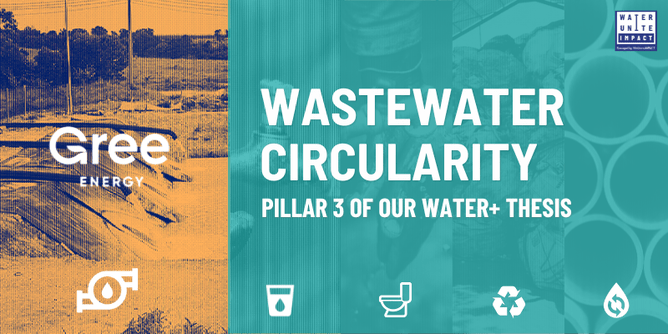From negative inputs to positive outputs: Gree Energy’s transformative approach to wastewater management
Water Unite’s Third Pillar of the Water+ thesis, Waste Water Circularity, is an essential step in our mission to provide clean water for people and the planet, whilst simultaneously promoting sustainable water management practices that help to protect and restore the environment's ecosystems. The circular economy focuses on efficiently using resources, by recirculating materials to reduce the demand on environmental systems. Wastewater circularity focuses on the reuse and recycling of wastewater, helping to reduce the high demand for clean water to combat water scarcity.
Gree Energy, the focus of this spotlight, directly supports wastewater circularity through innovative processes which effectively treat wastewater pollution from the food processing industry, to biogas solutions which can be used to generate electricity. Such technology significantly shifts the value proposition of wastewater management by creating a valuable positive output: sustainable energy.
Gree energy, based in Indonesia, aims to tackle wastewater from the food processing industry whilst leveraging renewable energy to support local communities. Although people are becoming more aware of the environmental costs of agriculture, the impacts of the food processing industry are often underestimated. This is especially true in emerging markets where the food industry is the source of massive methane emissions and water pollution. In Indonesia, 90% of industrial food processors lack modern wastewater treatment and methane reduction systems. As a result, contaminated water from industry is often discharged into rivers and waterways which creates significant risks for public health and wider ecosystems. Nico Stirer, the founder and CEO of Gree Energy, highlighted the importance of protecting public watercourses in a previous interview with Water Unite:
‘As access to water is becoming more and more difficult and will continue to do so with climate change, the issue of reducing the level of pollution in the natural watercourse is extremely important’ - Nico Stirer
Gree Energy’s flagship partnership, the Hamparan project, is a powerful example of how wastewater treatment can be used to leverage renewable energy in support of local communities. Through their partnership with a local food processing company Gree Energy captures fugitive methane emissions created during production and uses anaerobic digestion to create biogas whilst also treating the wastewater. Every year the factory produces 40,000 tonnes of tapioca flour, a staple of Indonesian cuisine, which consequently results in water pollution equivalent to 300,000 people. However, Gree Energy’s treatment solution removes 97% of the water pollution and renewable energy is distributed to 19 nearby villages, through power purchase agreements with local municipalities.
Looking ahead Gree Energy is exploring opportunities to scale its solutions with another key partnership, the Riam mill, currently underway. Upon completion the project will contribute to an emissions reduction of 40,000 tCO2eq/year whilst also generating sustainable energy for local communities. In February 2024, Gree Energy was awarded the Dubai International Best Practices Award in the ‘Addressing Climate Change and Reducing Pollution’ category. This award, organised in collaboration with UN Habitat, highlights the outstanding contribution Gree Energy has made to the Sustainable Development Goals on a global scale as well as their commitment to innovation and progress.
As climate change increases the pressures of water scarcity and pollution, water circularity is becoming increasingly important. Companies such as Gree Energy provide a vital connection between industry stakeholders and local environments, supporting local ecosystems and communities in Indonesia through sustainable wastewater management and energy generation. However, as Nico emphasises: ‘Reconnecting companies with the ecosystem they depend upon isn’t only true for upstream food processors in emerging countries’, highlighting the potential and need for such systems to be implemented globally.

